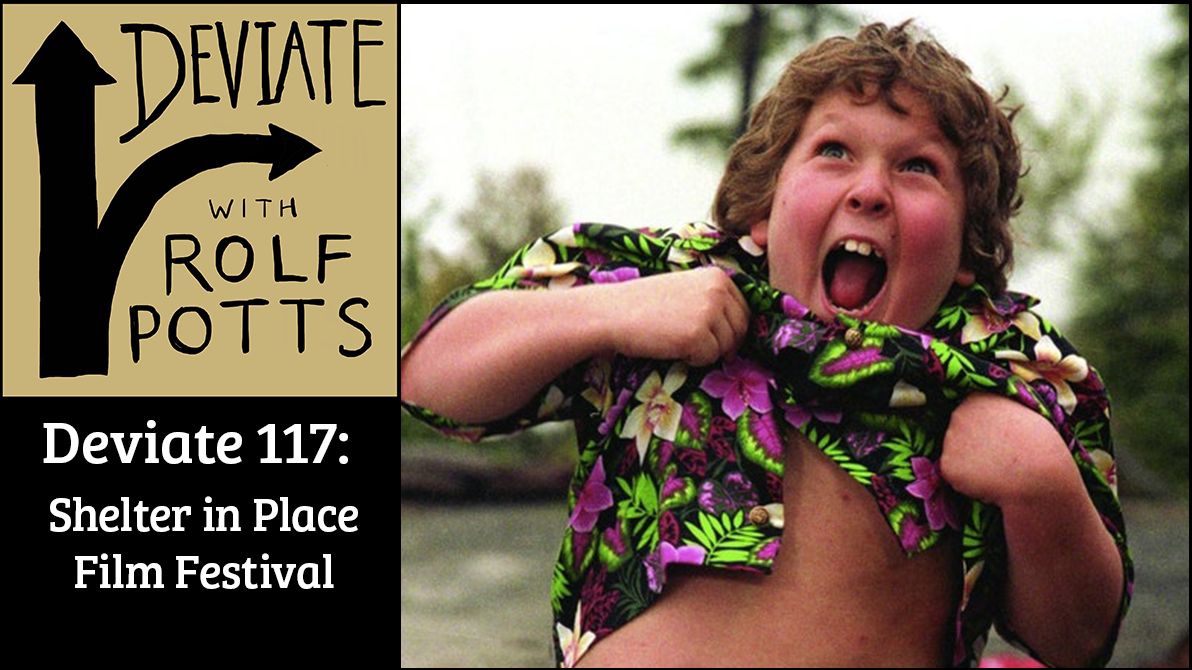
“Binge watching is designed to make time disappear. A home film festival is designed to be time well spent.” –Kevin Smokler
Kevin Smokler (@weegee) is a writer, public speaker, critic, and author of Brat Pack America and Practical Classics. He speaks on the future of media and culture and his written work has appeared in such publications as the Los Angeles Times, Buzzfeed, and Vulture. He previously appeared as a guest on Episode 33 of Deviate, Why 1980s coming-of-age movies matter, and Episode 60, “Celebrating the best travel movies ever.”
In this episode of Deviate, Rolf and Kevin explain how to organize and execute a Shelter in Place Film Festival as an alternative to bingeing video during a time of pandemic. Kevin hosts a full guide online at his website, but here’s an outline version:
Notes on creating a Shelter in Place Film Festival
- Establish a time-constraint
An afternoon? A day? A weekend? Film Festivals are inherently a time-bound activity.
It may seem counterintuitive to begin planning with how much time you wish to spend watching movies rather than how many or what movies you wish to see. But you can always add movies if everyone’s having a great time, or cut the lineup short if everyone’s falling asleep.
Setting a time-limit also creates reasonable expectations. Watching eleven movies in a day is not going to happen. Watching three over a week might seem anti-climactic, something you’d do anyway instead of creating an event. Film festivals are about maximizing quality for each hour spent watching, not about watching until you and your guests physically can’t anymore.
- Establish who will be a part of it
A film festival for just you and your loved ones at home is the easiest way to do this. Level up by inviting friends or another family to join: Everyone watches the movies in their own home then signs on to Zoom or Google Hangout afterward at a designated time to talk about the movie you just saw.
If you’re making it a truly virtual film festival, it’s a bit more important to stick to a schedule so all participants know when they should be watching and when they should be talking with each other.
- Choose a leader and delegate responsibilities
You can either designate a leader who picks all the movies, or you can create a list based on a theme (see next) and vote. A designated leader, like dictatorship, is more efficient. Democracy, as Oscar Wilde said, “is great but takes up a lot of weeknights.”
If you’re the leader, do your own research and come up with the program or poll your own electorate of family and friends for both a theme or movies that fit it. But remember, this kind of film festival is designed to entertain the guests, not show what sort of genius you were for coming up with the event in the first place.
Film festivals benefit from a strong leader so the movies are well chosen and hang together. Someone who is a leader, but listens to those he/she has invited to the festival.
- Pick a theme or organizing principle
Festivals have themes to distinguish themselves from binge watching. The idea is many movies creatively grouped in a interesting way. Half the joy is coming up with that creative list rather than just hitting “next” on the remote control.
A Vertical Festival is usually organized around the body of work of a creative person (all of Denzel Washington’s pre-Oscar movies, all movies directed by Ava Duvernay). The purpose of a Vertical Festival is to notice commonalities (Michael Douglas never plays a working-class person) and evolutions (Laura Dern often played quiet characters in her 20s and loud characters in her 40s and 50s).
A Horizontal Festival is organized around something non-people-related that all the chosen movies have in common (movies who all have “Star” in their name, movies that take place in Chicago). The purpose of a Horizontal Film Festival — because you have declared the thing they have in common up front — is to notice differences (look how many different kinds of movies took place only at night).
A Spring-Cleaning Festival is a conscious attempt to see movies that have languished on your to-be-watched list for too long. A Spring-Cleaning Festival is better reserved for a my-family-only kind of festival where everyone’s had a hand in the queue to be cleaned out in the first place.
A Hall of Fame Festival is usually grouped around the perceived “best” movies in a genre (Romantic Comedies) or a given time period (the 1990s). A Hall of Fame Festival will inspire debate and discussion b/c “best” is a subjective criterion.
A Hub and Spoke Festival will begin with a beloved, well known film, then move on to ancillary movies (another movie by that director, a remake, another movie featuring a jazz soundtrack) and material (short films from that director, a documentary about the hub film’s subject) from there. A Hub and Spoke Festival usually needs a strong leader to push the spokes out far enough from the hub so the movies at this festival feel different enough from one another.
- Choose which movies you will watch
Whether you go with one leader or a group vote, start by collectively making a first draft list of movies that fit your theme. Most likely it will be longer than the time you have. If it is, either the group votes or the leader should choose using their best judgment. Failing either of those, go with the movies highest rated on Rotten Tomatoes (unless you are really into watching bad movies).
- Choose a method for watching the movies
It is best to have either hard copies of your chosen films, either on DVD or digital download. Streaming services are notorious for removing movies from their library without telling anybody and you don’t want to depend on a movie being available service on day of your festival because there’s no promise of that.
- Create a schedule and film-order
Unless your theme requires you to go in a specific order, start with a short fun, banger of a film to whet everyone’s appetites. End on a movie with uplift because if you end with a horribly depressing movie, the audience will not only feel depressed about the movie, but the festival itself (and most likely you as well). In between, you generally want to alternative between heavy and light emotional tones, between short and long run-times.
- Mix things up when it’s over
After your festival do something completely different, like go for a hike or call someone. Watching a bunch of movies in a row can be a mostly forgettable activity if it’s all swallowing and no digesting.
The Deviate theme music comes from the title track of Cedar Van Tassel’s 2017 album Lumber.
Note: We don’t host a “comments” section, but we’re happy to hear your questions and insights via email, at deviate@rolfpotts.com.





